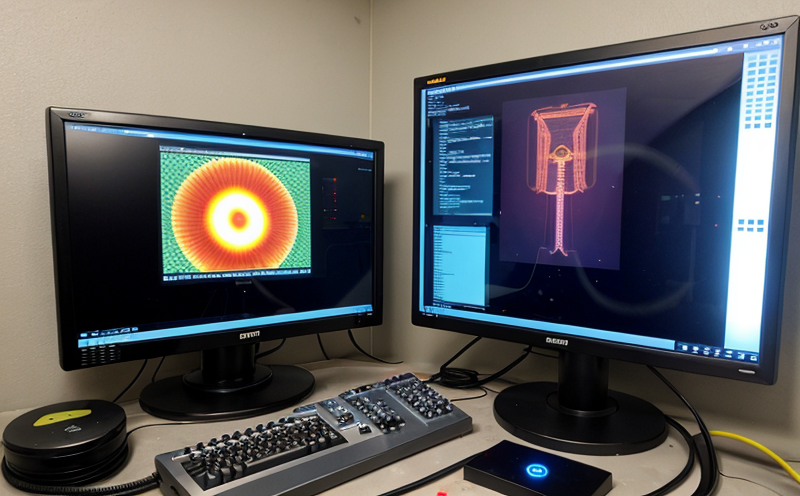EN 50121 EMC Testing for Railway Applications
The European Standard EN 50121 is specifically designed to ensure that railway electronics meet stringent electromagnetic compatibility (EMC) requirements. This standard addresses the need to protect electronic equipment from electromagnetic disturbances and to avoid generating interference that could disrupt other systems within a railway environment.
Electromagnetic Compatibility Testing under EN 50121 ensures that all electrical and electronic equipment used in rail transportation is resilient against electromagnetic interference (EMI) and does not emit excessive levels of EMI. This is crucial for maintaining the safety, reliability, and efficiency of the railway system as a whole.
The standard applies to a wide range of products including signaling systems, train control units, communication devices, and power supplies used in rail applications. It aims to prevent failures that could lead to accidents or disruptions in service. The testing is essential for compliance with regulatory requirements across European Union countries.
EN 50121-4 covers emissions from electrical equipment, ensuring it does not interfere with other equipment within the railway environment. EN 50121-3 focuses on immunity to electromagnetic interference, ensuring that equipment continues to function correctly despite exposure to such interference.
The testing process involves a series of controlled experiments and measurements aimed at evaluating how well the electronic devices meet the specified standards. Specimen preparation is critical; it includes selecting appropriate test samples representative of the products they are meant to emulate in real-world conditions.
Instrumentation plays a vital role in this testing procedure, with various specialized equipment used throughout different stages. For instance, spectrum analyzers measure electromagnetic emissions, ensuring they fall within acceptable limits set by EN 50121-4. Similarly, immunity tests utilize controlled interference sources to assess the resilience of components against disruptive signals.
Reporting is comprehensive and detailed, providing insights into the performance of tested equipment under various conditions relevant to railway applications. Compliance with these standards not only enhances safety but also contributes significantly towards reducing maintenance costs by preventing failures due to electromagnetic issues.
Applied Standards
| Standard | Description |
|---|---|
| EN 50121-4: Railway Signalling and Communications Systems - Part 4: Electromagnetic Compatibility (EMC) Requirements | This part specifies the emission limits for railway signaling systems to ensure they do not interfere with other equipment. |
| EN 50121-3: Railway Signalling and Communications Systems - Part 3: Electromagnetic Compatibility (EMC) Test Methods | This part outlines test methods used to evaluate the immunity of railway signaling systems against electromagnetic interference. |
The application of these standards ensures that all electronic devices in rail applications are robust and reliable, contributing to safer and more efficient operations. By adhering strictly to EN 50121-4 and EN 50121-3, manufacturers can ensure their products meet the stringent requirements set forth by this standard.
Customer Impact and Satisfaction
- Enhanced Safety: Ensures equipment does not cause or suffer from electromagnetic interference, reducing risks associated with malfunctions in critical systems.
- Better Reliability: Equipment that meets EMC standards is less likely to fail unexpectedly, leading to fewer disruptions in service.
- Regulatory Compliance: Meeting EN 50121 helps avoid penalties and ensures smooth market access across the EU.
- Improved Reputation: Demonstrating adherence to recognized international standards enhances brand reputation among stakeholders.
Customer satisfaction is paramount, and by ensuring compliance with these standards, we contribute directly to achieving this goal. Our services aim not only at meeting regulatory requirements but also at providing solutions that add value beyond mere compliance.
International Acceptance and Recognition
The EN 50121 series of standards is widely recognized across Europe and increasingly being adopted internationally due to its comprehensive approach towards ensuring EMC in rail applications. Many countries outside the EU have either adapted these standards into their own national regulations or are considering doing so.
Recognizing the importance of consistent quality assurance, many organizations have started implementing EN 50121-4 and EN 50121-3 as part of their product development processes. This not only aids in meeting local market requirements but also facilitates easier exportation to other regions where these standards are accepted.
Our laboratory plays a pivotal role in supporting clients by offering robust testing services that align perfectly with the expectations set out by EN 50121-4 and EN 50121-3. By leveraging our expertise, we help ensure that every product tested meets these challenging standards, thereby contributing to safer, more reliable railway systems.





